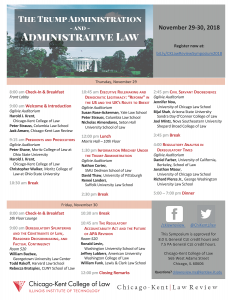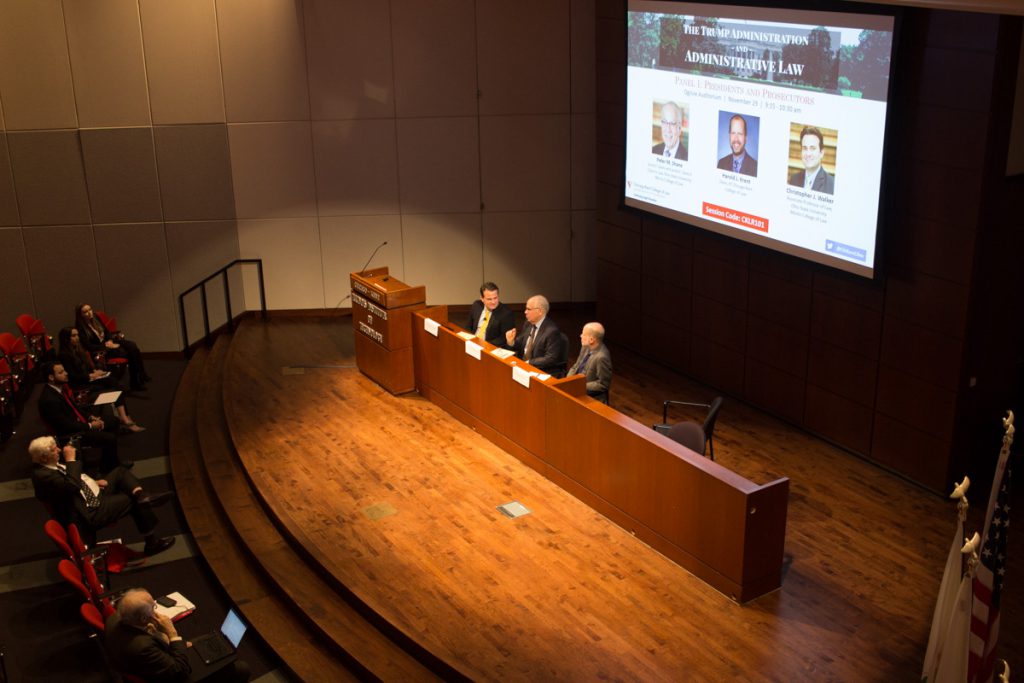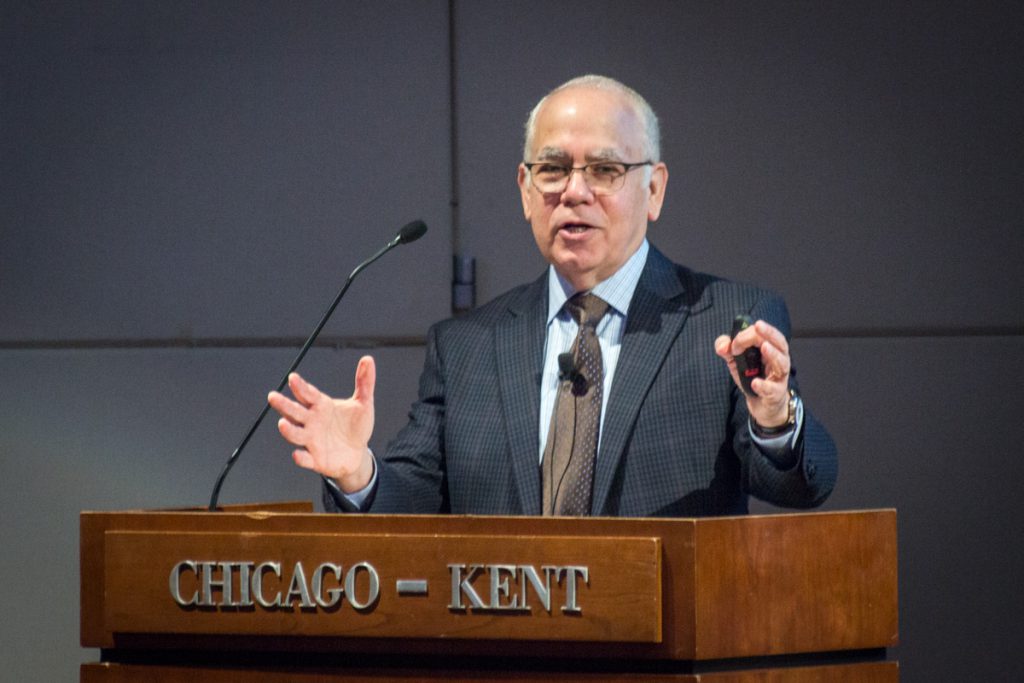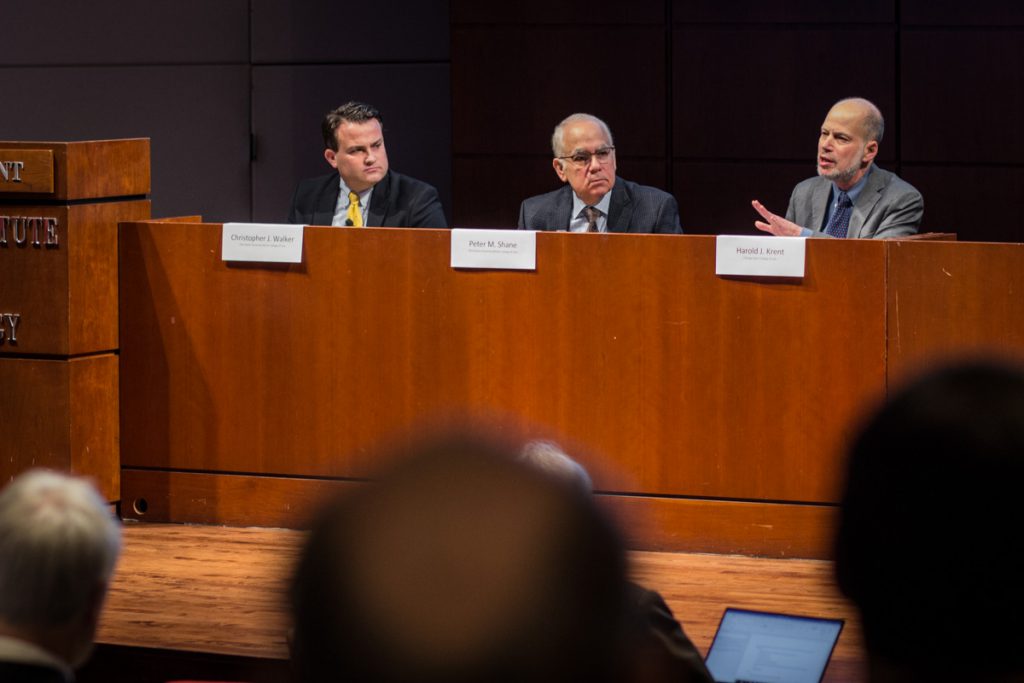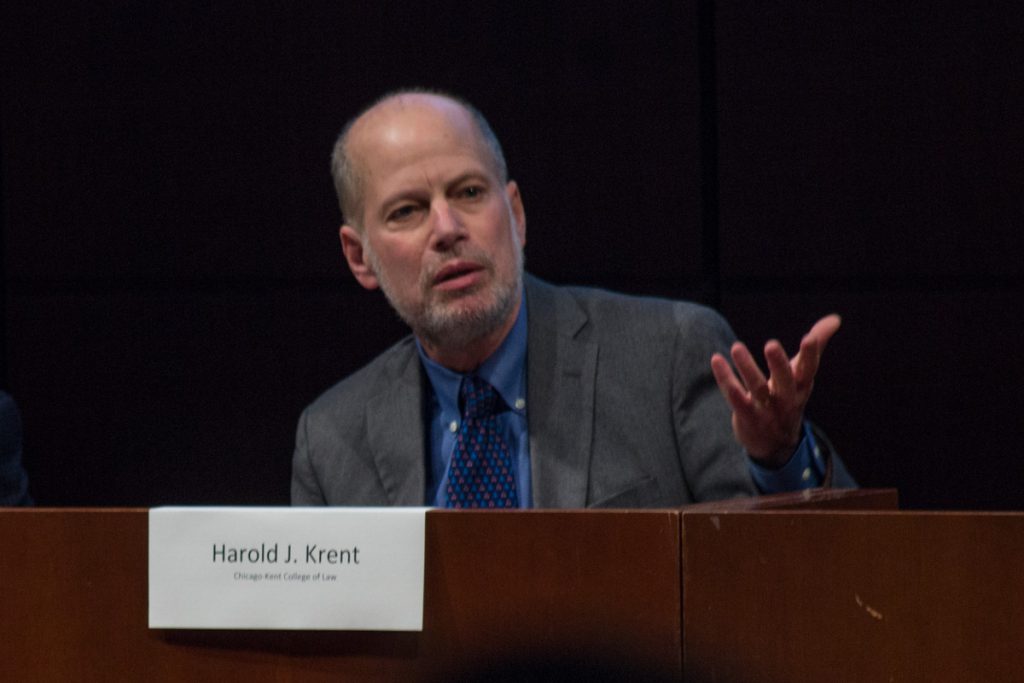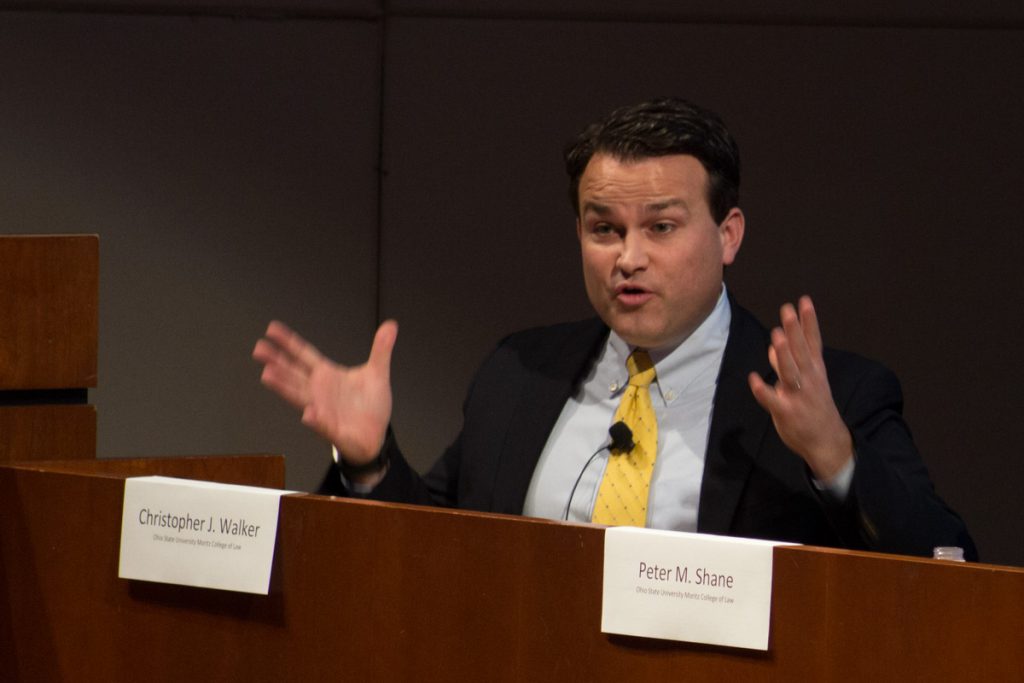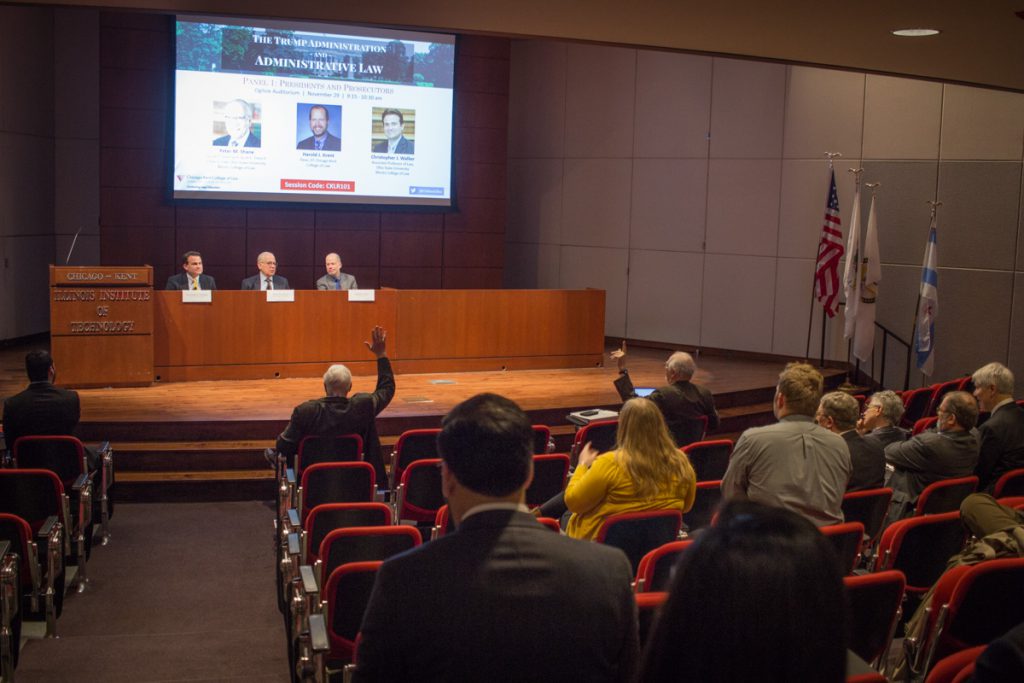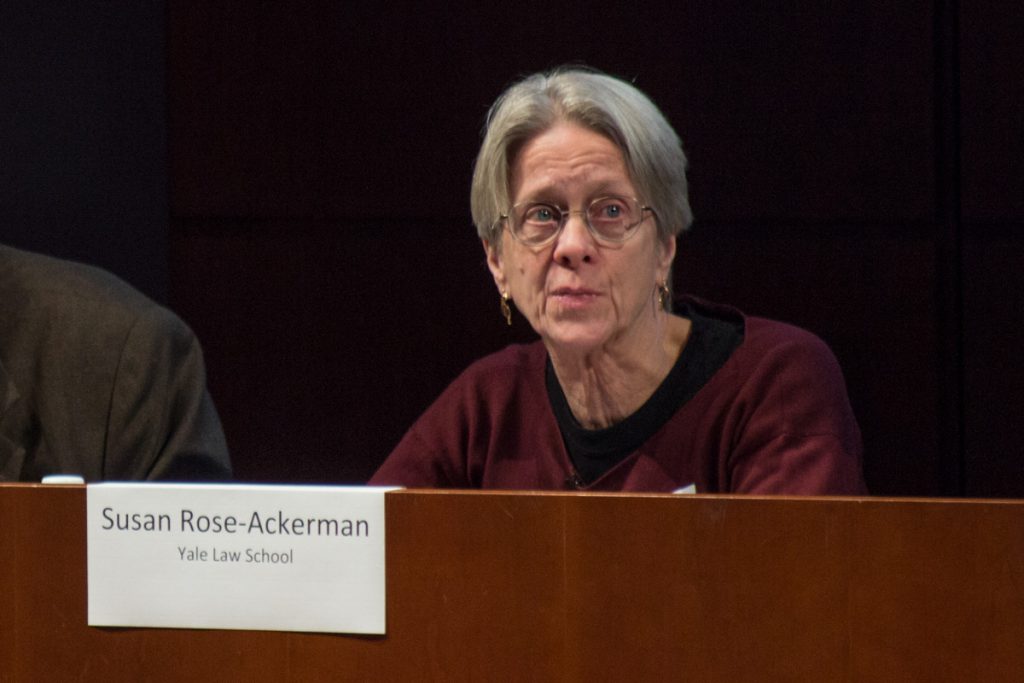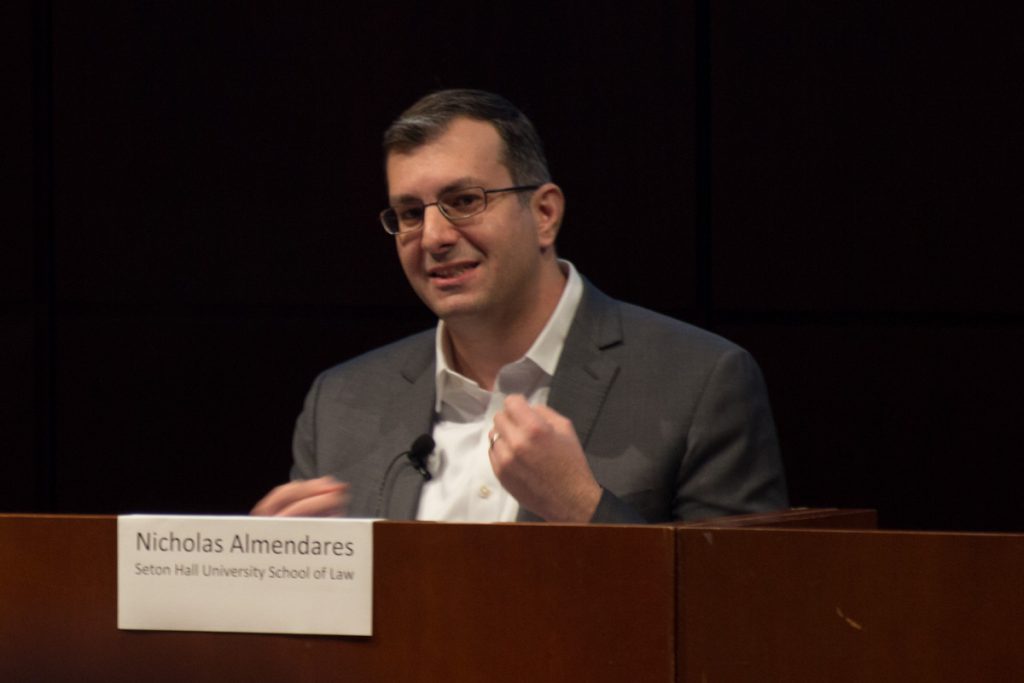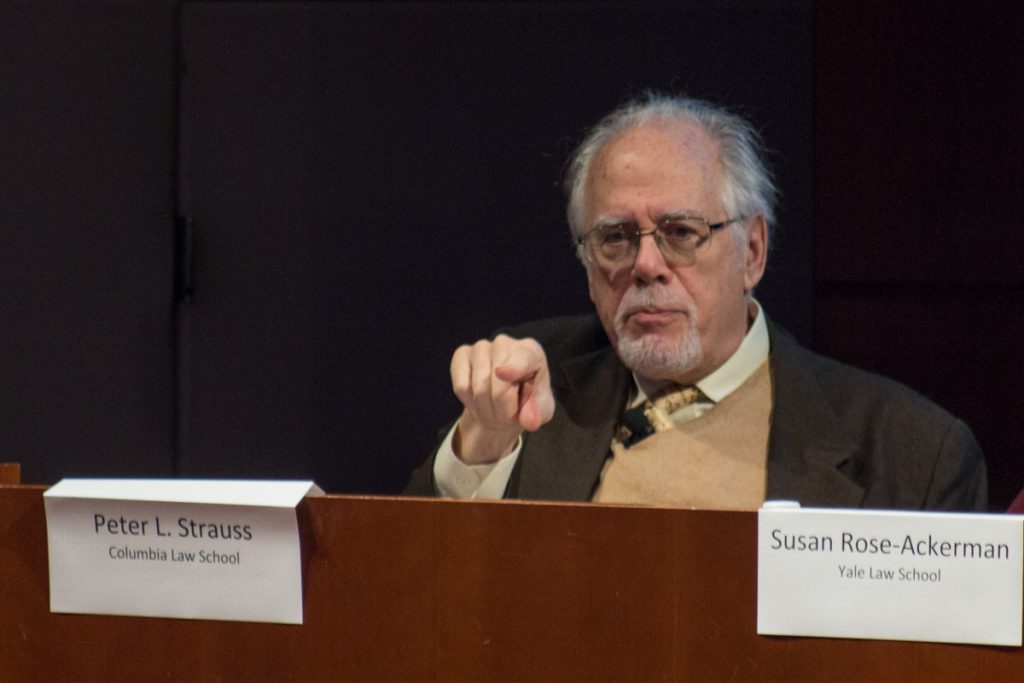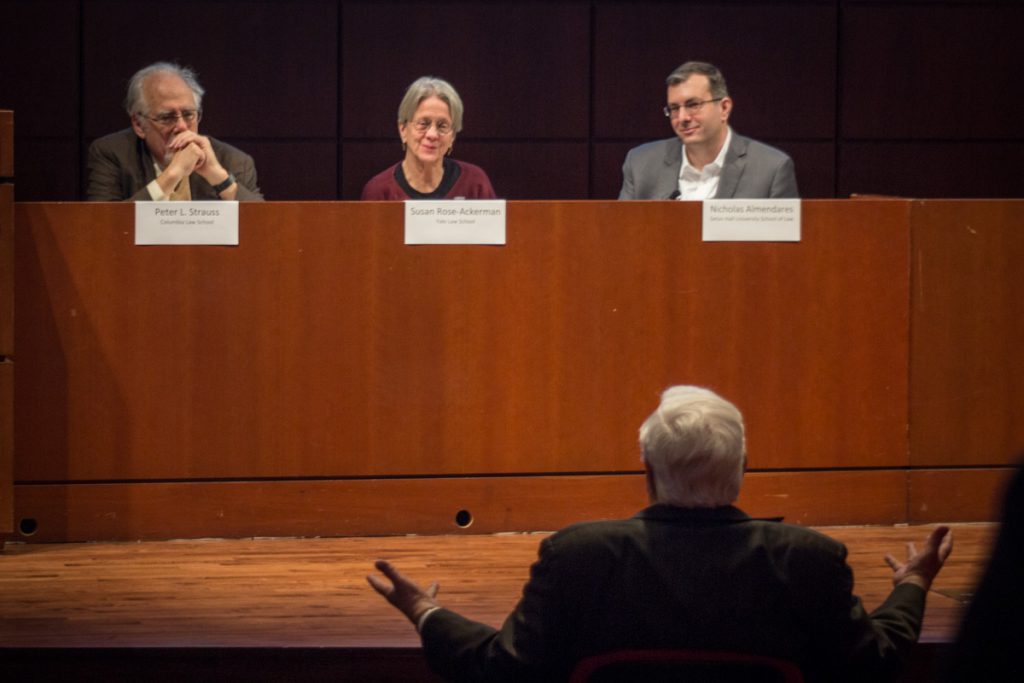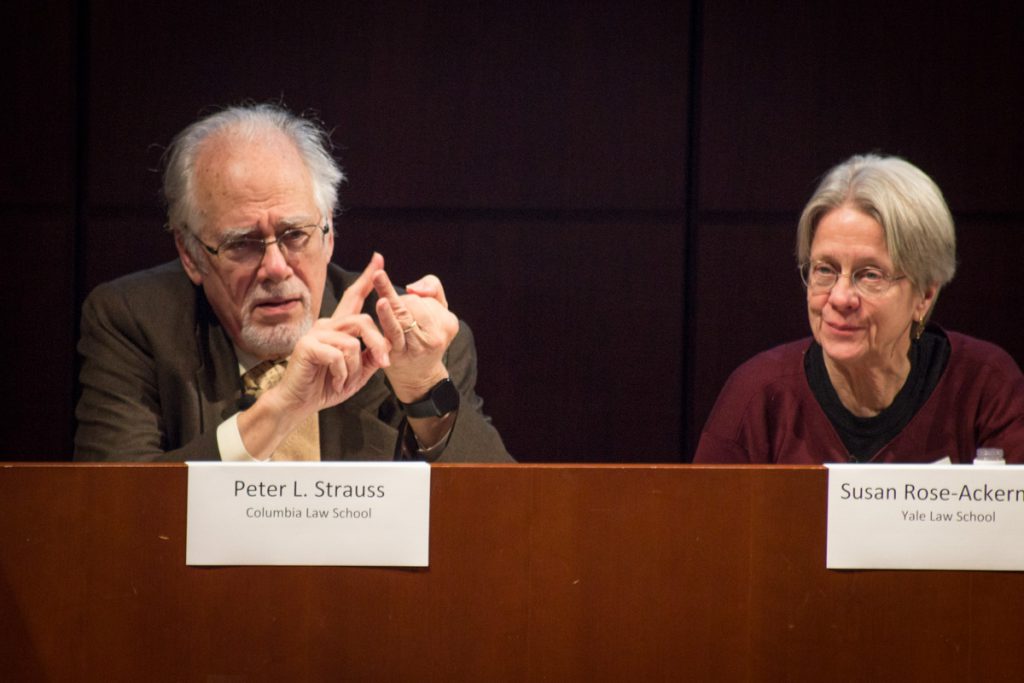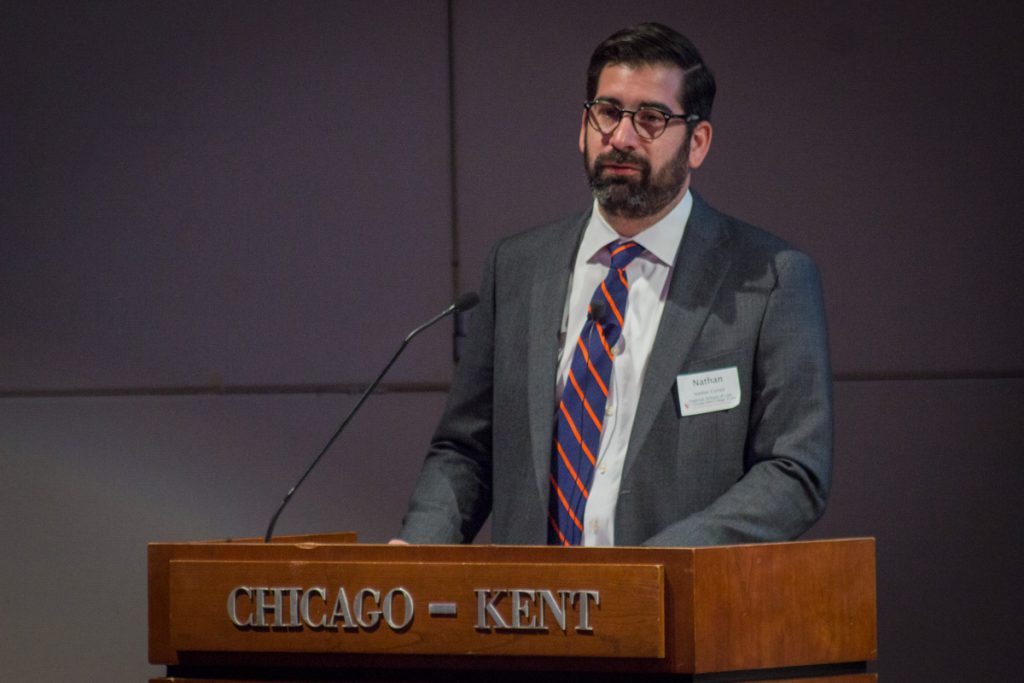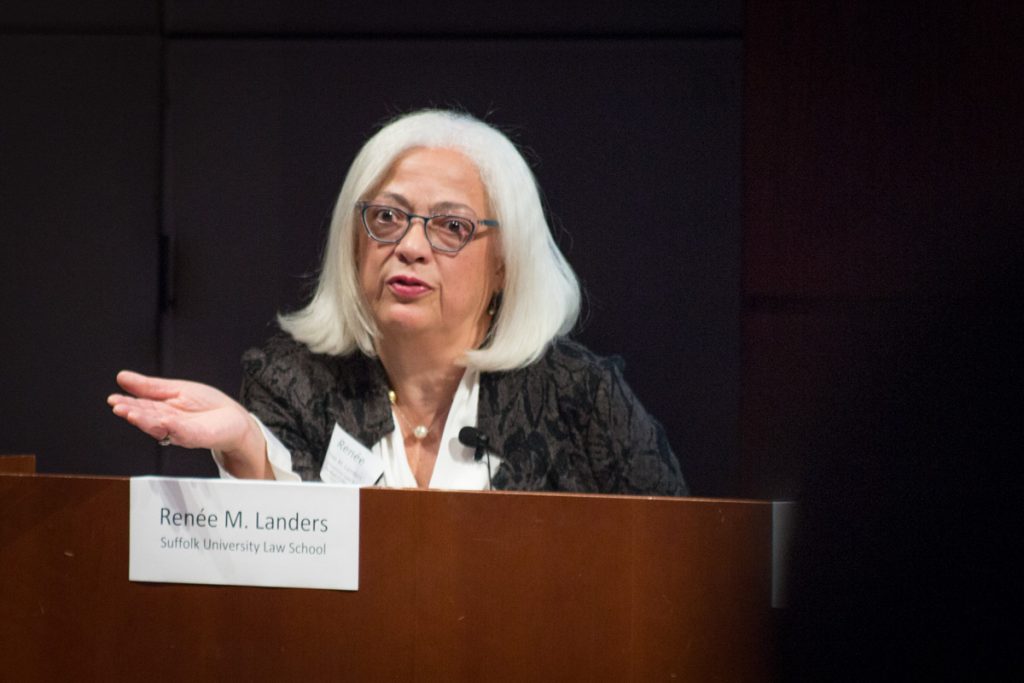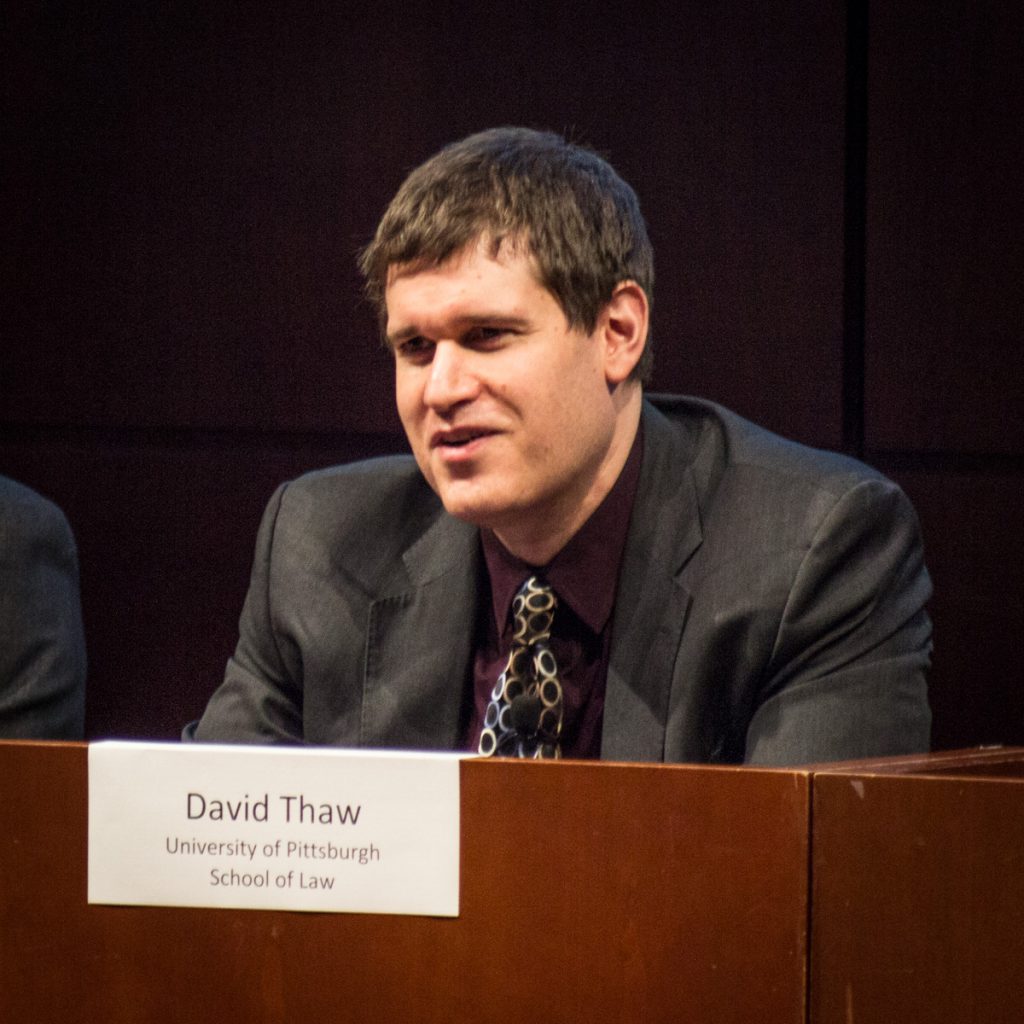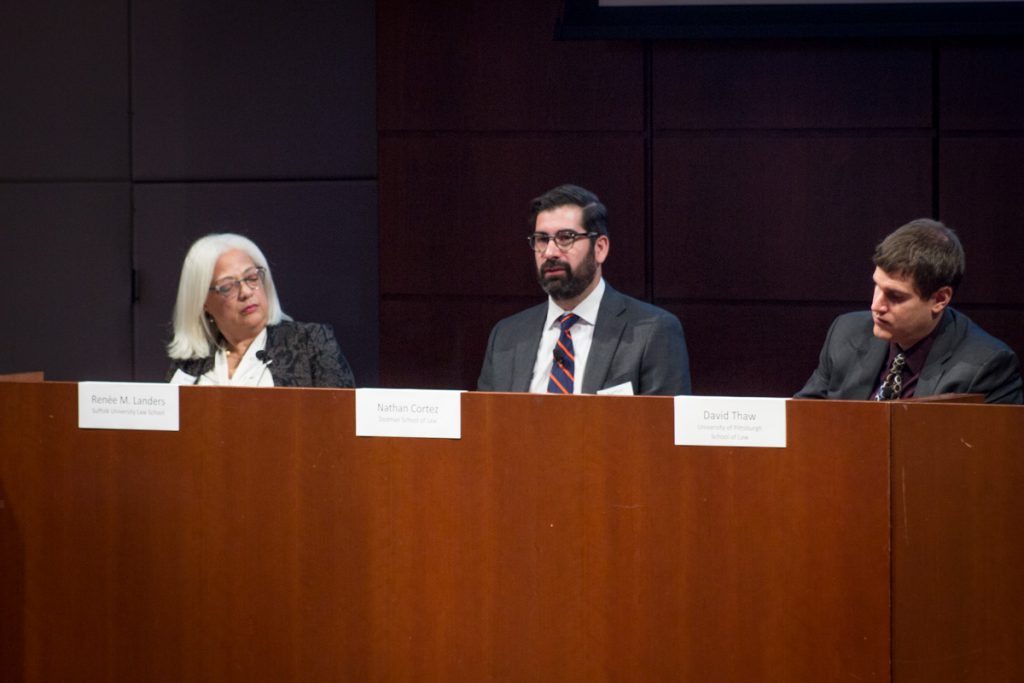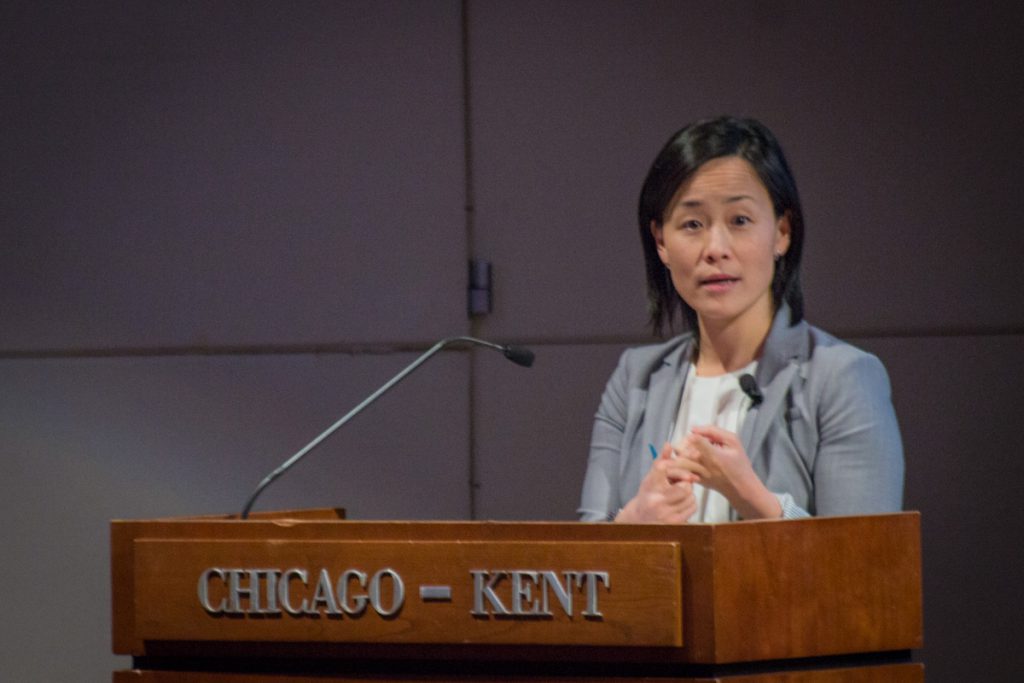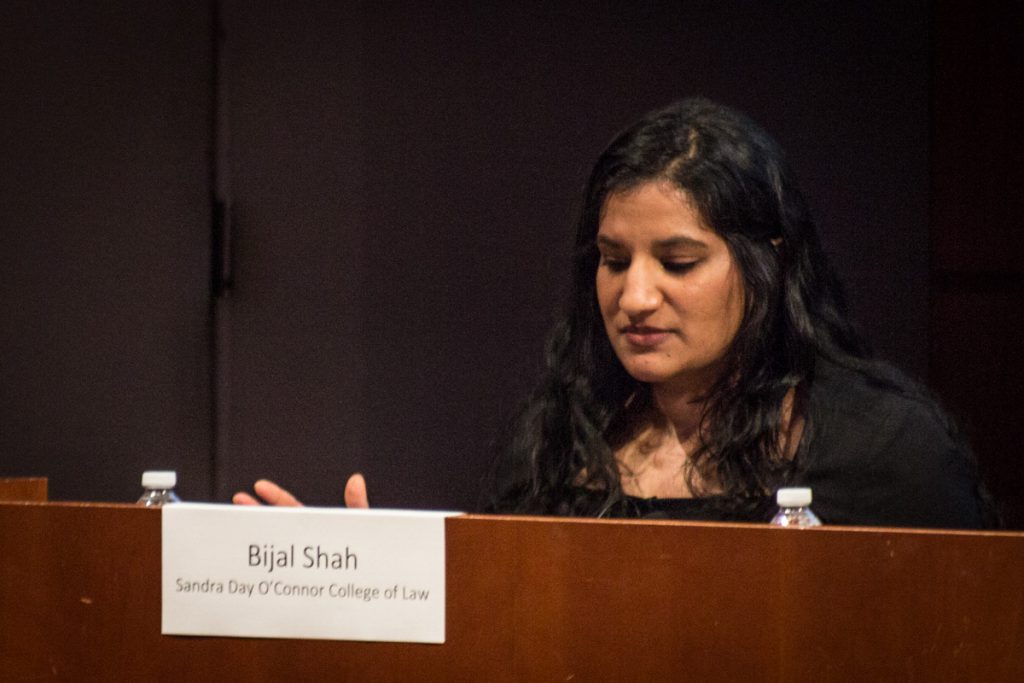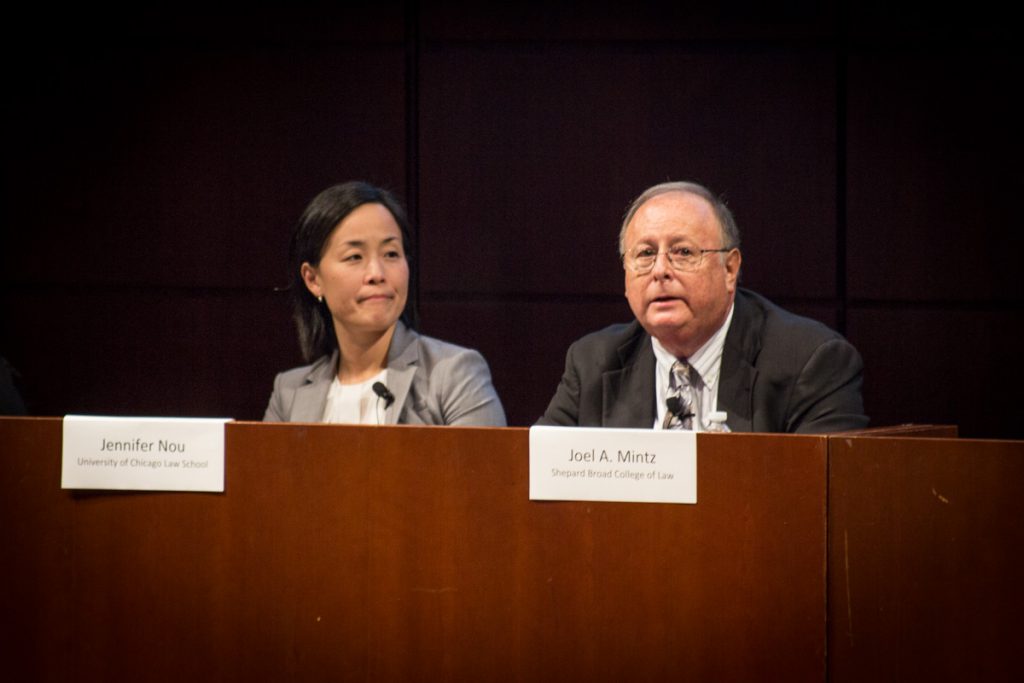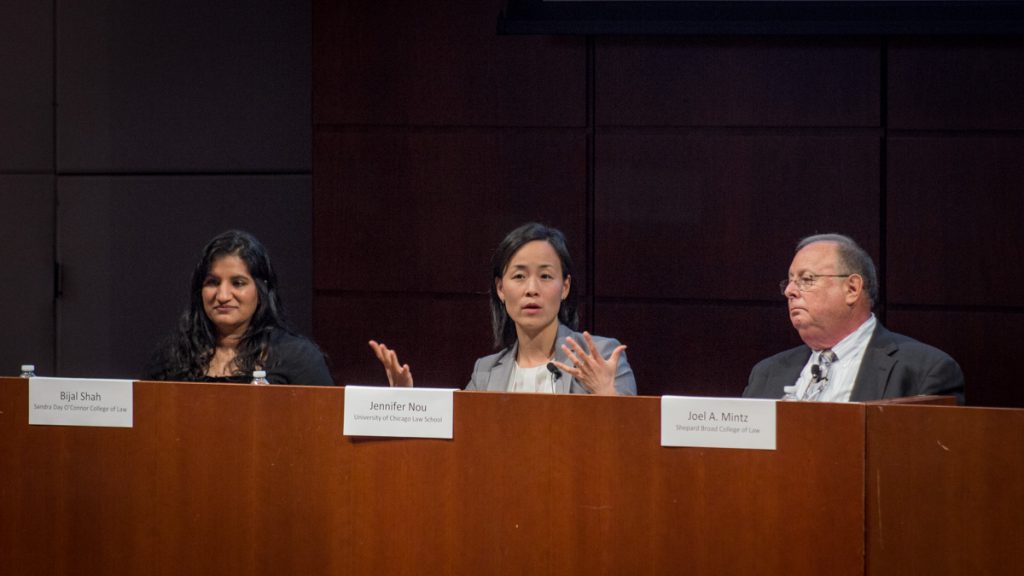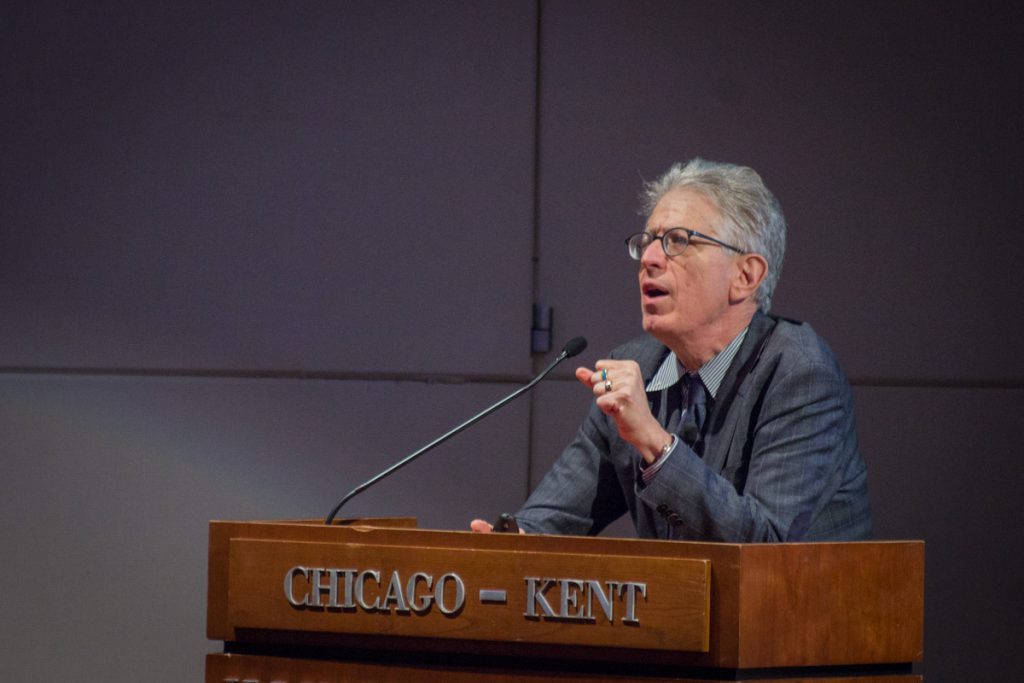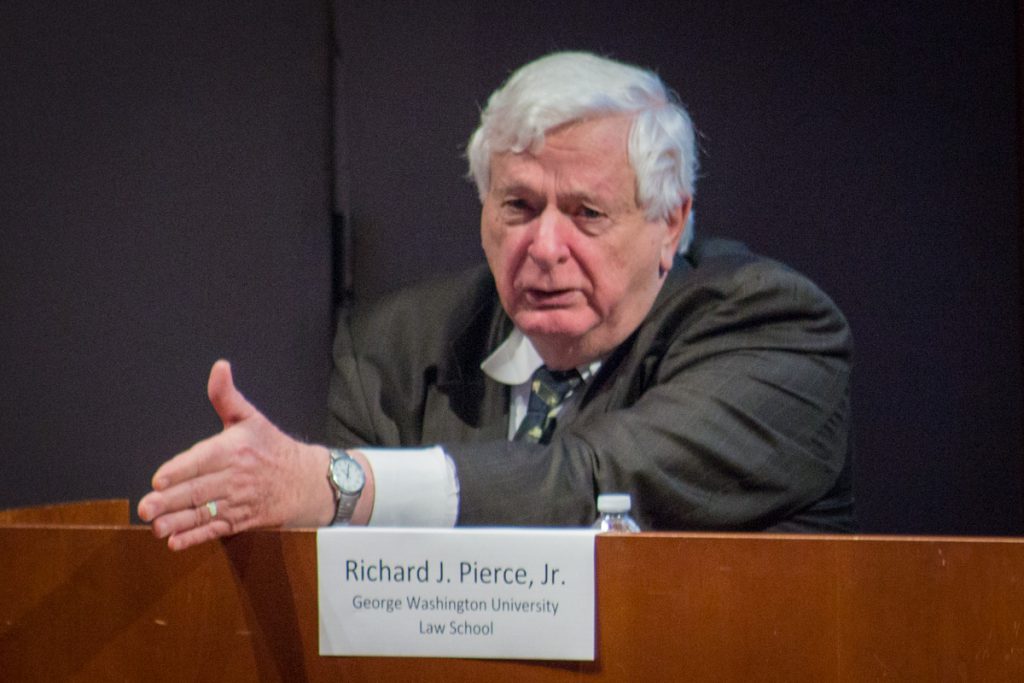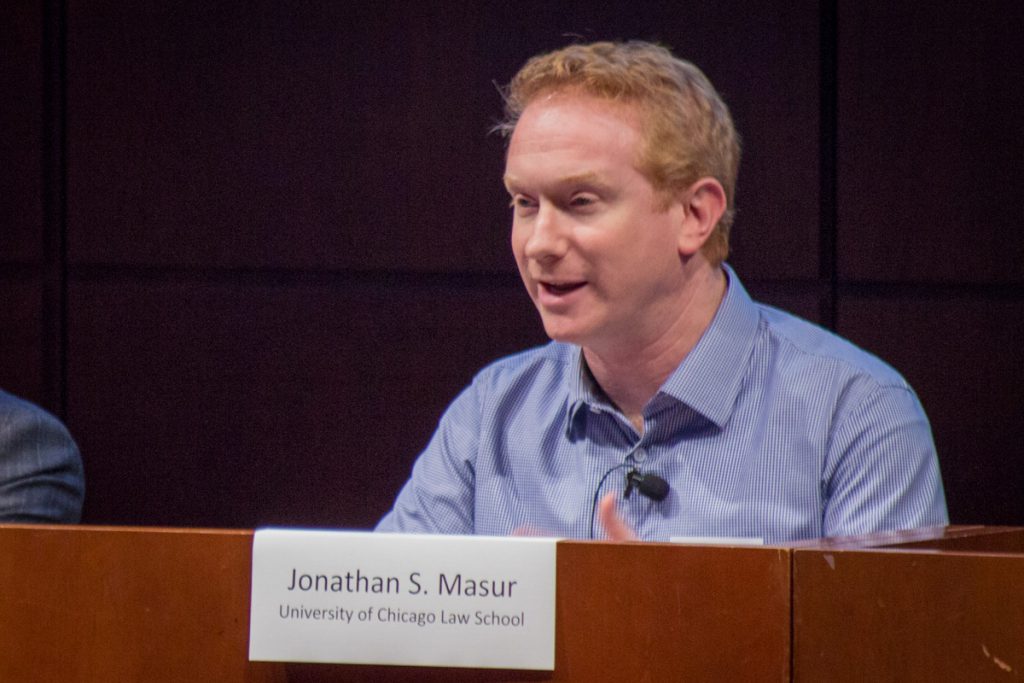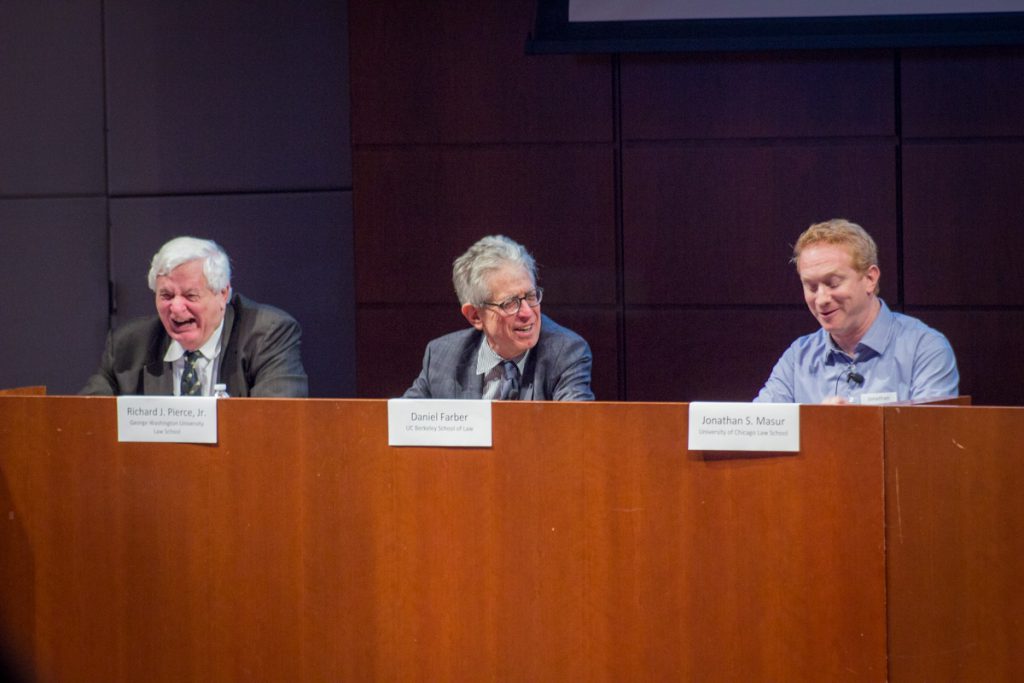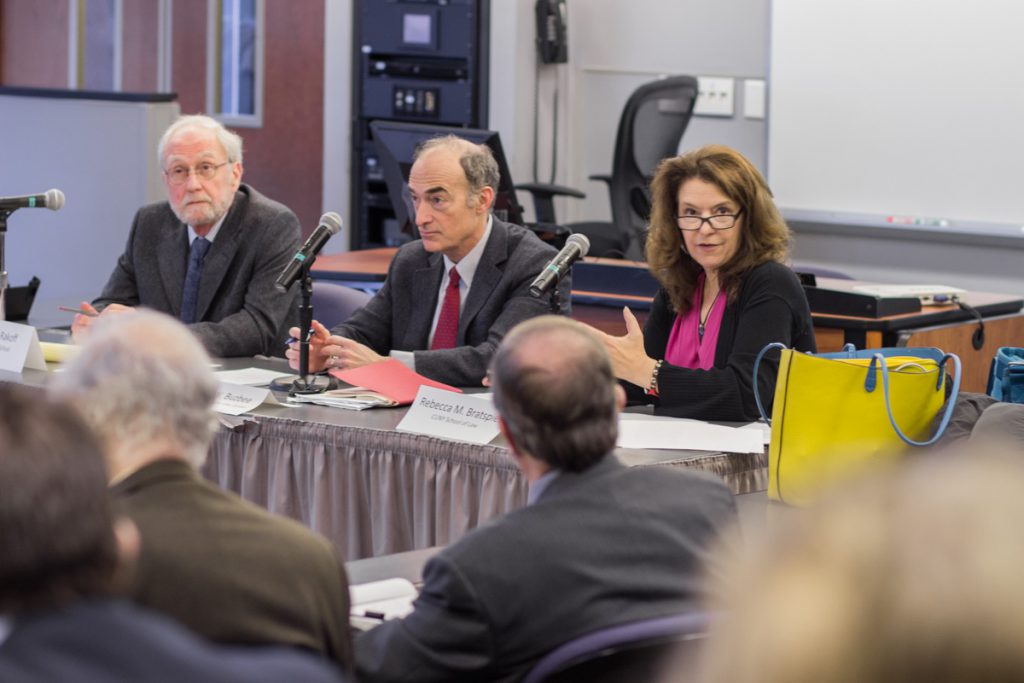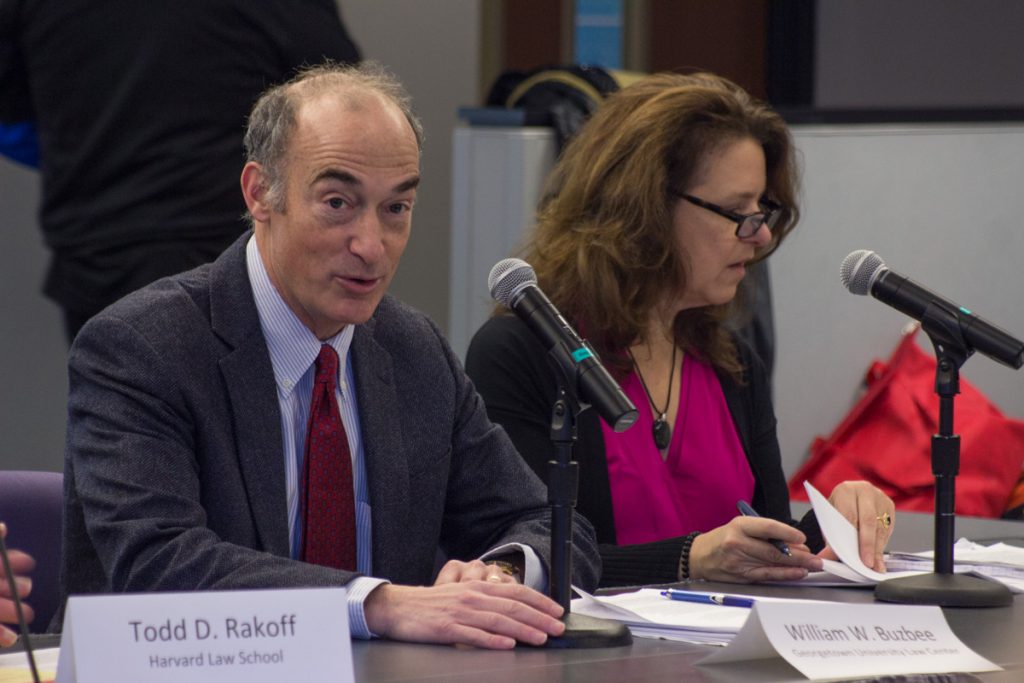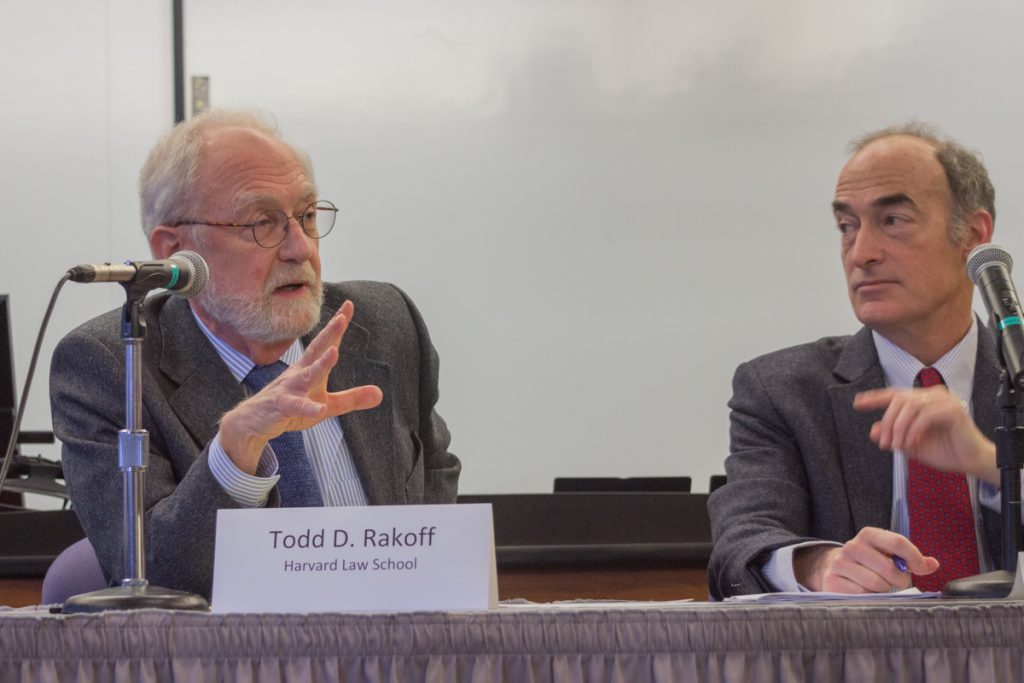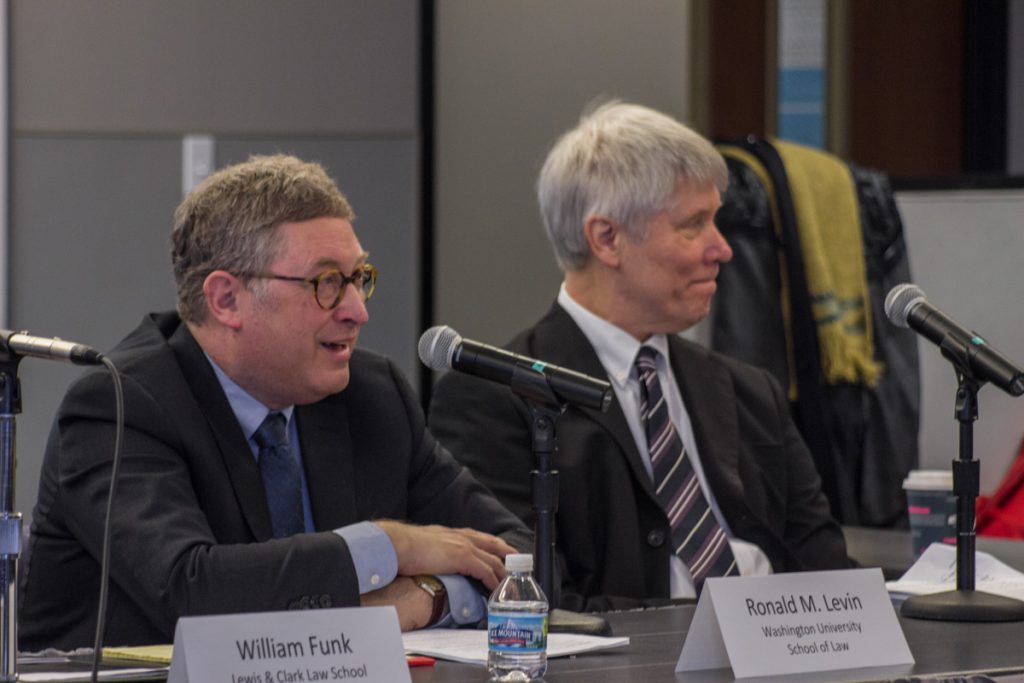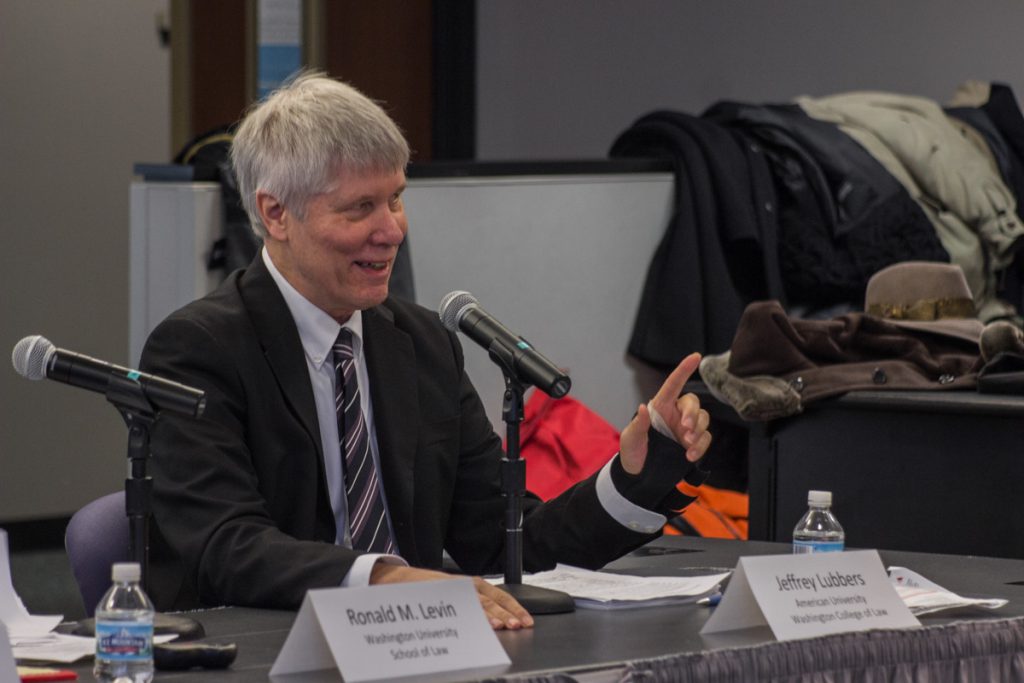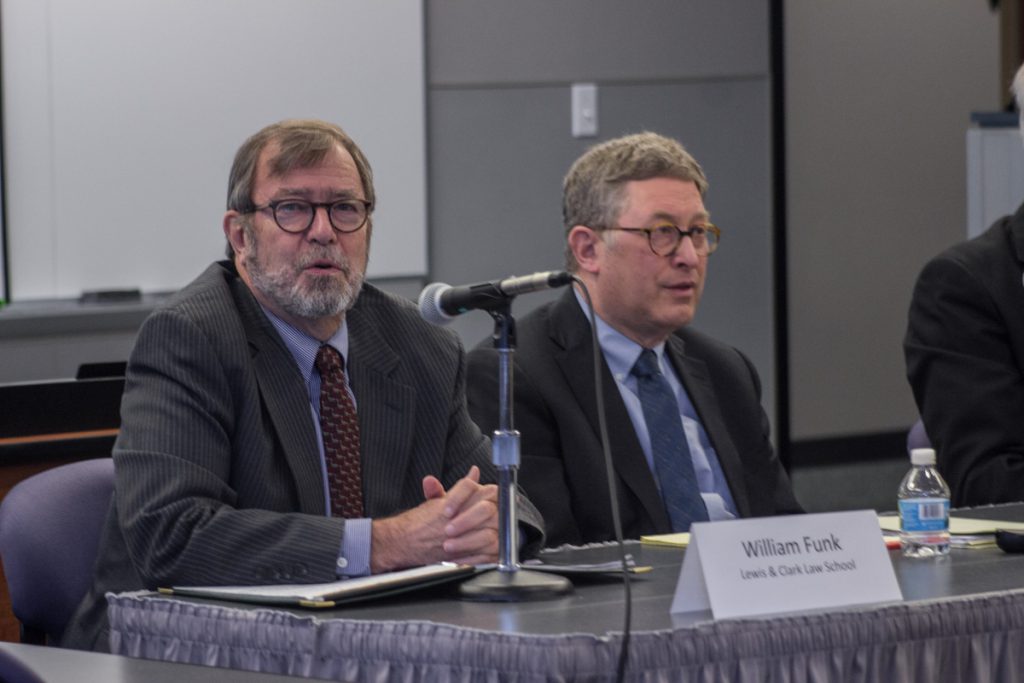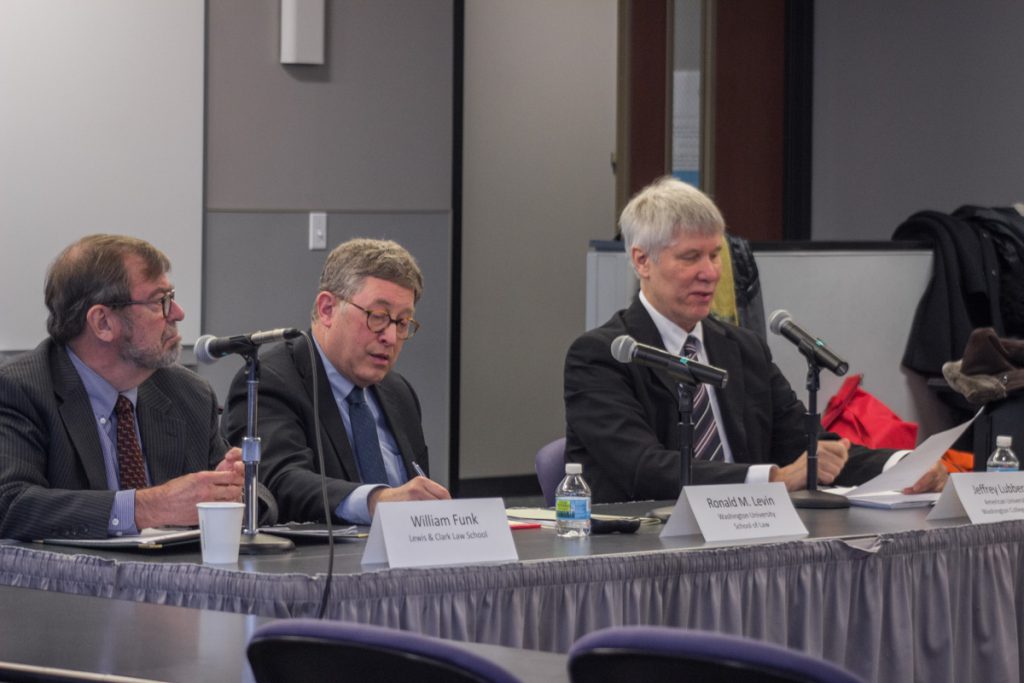The Trump Administration and Administrative Law
2018 Chicago-Kent Law Review Live Symposium
Symposium Editor
Professor Peter L. Strauss, Columbia Law School
Chicago-Kent College of Law
565 West Adams Street
Chicago, Illinois 60661
November 29–30, 2018
Directions and Parking
Contact: Madeline Huerta | cklawreview.me@kentlaw.iit.edu
The Symposium is free and has been approved for 8.25 IL General CLE Credit Hours and 8.0 PA General CLE Hours. Registration is now closed, thank you for your interest.
Schedule – Day One
| 8:00am–9:00am | Check-In & Breakfast | Front Lobby |
| 9:00am–9:15am | Welcome & Introduction | Ogilvie Auditorium |
| 9:15am–10:30am | Panel 1: Presidents and Prosecutors | Ogilvie Auditorium |
| 10:30am–10:45am | Break | Front Lobby |
| 10:45am–12:00pm | Panel 2: Executive Rulemaking and Democratic Legitimacy: “Reform” in the US and the UK’s Route to Brexit | Ogilvie Auditorium |
| 12:00pm–1:30pm | Lunch | Morris Hall |
| 1:30pm–2:30pm | Panel 3: Information Mischief under the Trump Administration | Ogilvie Auditorium |
| 2:30pm–2:45pm | Break | Front Lobby |
| 2:45pm–3:45pm | Panel 4: Civil Servant Disobedience | Ogilvie Auditorium |
| 3:45pm–4:00pm | Break | Front Lobby |
| 4:00pm–4:50pm | Panel 5: Regulatory Analysis in Deregulatory Times | Ogilvie Auditorium |
| 4:50pm–5:00pm | Closing Remarks | Ogilvie Auditorium |
| 5:00pm–7:00pm | Dinner Reception |
Panel Participants
Panel 1: Presidents and Prosecutors
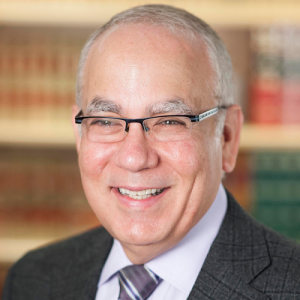 Peter M. Shane, Jacob E. Davis and Jacob E. Davis II Chair in Law, Ohio State University Moritz College of Law
Peter M. Shane, Jacob E. Davis and Jacob E. Davis II Chair in Law, Ohio State University Moritz College of Law
Professor Peter M. Shane came to Ohio State in 2003 from Carnegie Mellon University’s H. John Heinz III School of Public Policy and Management. He is an internationally recognized scholar in administrative law, with a specialty in separation of powers law and has co-authored leading casebooks on each subject. He has served on the faculty at the University of Iowa College of Law and was dean at the University of Pittsburgh School of Law.
In addition to his outstanding law teaching and scholarship, Professor Shane has received a National Science Foundation grant for interdisciplinary study related to cyberspace and democracy. At Ohio State, he provides strong leadership in interdisciplinary scholarship and teaching.
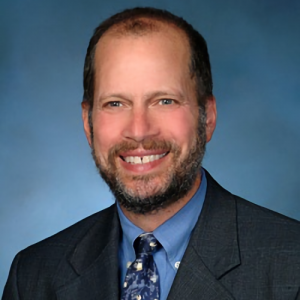 Harold J. Krent, Dean, IIT Chicago-Kent College of Law
Harold J. Krent, Dean, IIT Chicago-Kent College of Law
Dean Krent graduated from Princeton University and received his law degree from New York University School of Law, where he served as notes editor of the Law Review and garnered several awards for excellence in writing.
Dean Krent clerked for the Honorable William H. Timbers of the U.S. Court of Appeals for the Second Circuit and then worked in the Department of Justice for the Appellate Staff of the Civil Division, writing briefs and arguing cases in various courts of appeals across the nation. He has been teaching full-time since 1987 and has focused his scholarship on legal aspects of individuals’ interaction with the government. His recent book, Presidential Powers, is a comprehensive examination of the president’s role as defined by the U.S. Constitution and judicial and historical precedents.
In addition, Dean Krent has served as a consultant to the Administrative Conference of the United States. He has also litigated numerous cases with students on behalf of indigent prisoners. Dean Krent joined the IIT Chicago-Kent faculty in 1994. He was appointed associate dean in 1997 and interim dean in 2002 before assuming the deanship on January 1, 2003.
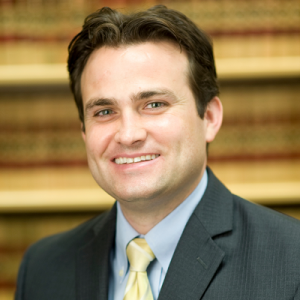 Christopher J. Walker, Associate Professor of Law, Ohio State University Moritz College of Law
Christopher J. Walker, Associate Professor of Law, Ohio State University Moritz College of Law
Christopher J. Walker is an Associate Professor of Law (with tenure) at The Ohio State University Moritz College of Law and Director of the Moritz Washington, D.C., Summer Program. At Moritz, he teaches Civil Procedure, Constitutional Litigation, the Ethics of Washington Lawyering, Federal Courts, Legal Analysis and Writing (LAW II), Legislation and Regulation, and State and Local Government Law.
Professor Walker’s research focuses primarily on administrative law, regulation, and law and policy at the agency level. His publications have appeared in the California Law Review, Michigan Law Review, Stanford Law Review, and the University of Pennsylvania Law Review, among others. He has also written a report for the Administrative Conference of the United States on the role of federal agencies in the legislative process, and he coauthors the agency adjudication chapter of the American Bar Association’s annual book Developments in Administrative Law and Regulatory Practice. His article Legislating in the Shadows was selected as the recipient of the 2016 American Association of Law Schools Scholarly Papers Competition Award.
Outside Moritz, Professor Walker serves as one of forty Public Members of the Administrative Conference of the United States, as Vice-Chair of the American Bar Association’s Section of Administrative Law and Regulatory Practice, and as a member of the Ohio State Bar Association’s Administrative Agency Law Specialty Board. He is also a regular blogger at the Yale Journal on Regulation and the Section Editor for Jotwell’s Administrative Law Section.
Panel 2: Executive Rulemaking and Democratic Legitimacy: “Reform” in the US and the UK’s Route to Brexit
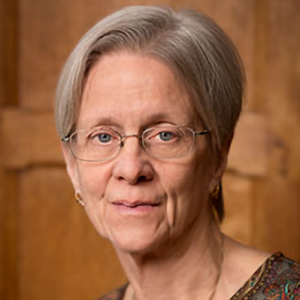 Susan Rose-Ackerman, Henry R. Luce Professor Emeritus of Jurisprudence, Yale Law School
Susan Rose-Ackerman, Henry R. Luce Professor Emeritus of Jurisprudence, Yale Law School
Susan Rose-Ackerman is the Henry R. Luce Professor Emeritus of Law and Political Science and Professorial Lecturer in Law, Yale University. She is the author of Corruption and Government: Causes, Consequences and Reform (1999, 2d edition with Bonnie Palifka, 2016), Due Process of Lawmaking: The United States, South Africa, Germany, and the European Union (with Stefanie Egidy and James Fowkes, 2015); From Elections to Democracy: Building Accountable Government in Hungary and Poland (2005); Controlling Environmental Policy: The Limits of Public Law in Germany and the United States (1995); Rethinking the Progressive Agenda: The Reform of the American Regulatory State (1992); and Corruption: A Study in Political Economy (1978). Her latest book, Comparative Administrative Law (2nd edition, with Peter Lindseth and Blake Emerson), was released in 2017. She holds a Ph.D. in economics from Yale University and has held fellowships at the Wissenschaftskolleg zu Berlin, at the Center for Advanced Study in the Behavioral Sciences in Palo Alto, at Collegium Budapest, and from the Guggenheim Foundation and the Fulbright Commission. She has published widely in the fields of law, economics, and public policy, and she has edited nine books on aspects of corruption and administrative law. Her research interests include comparative regulatory law and policy, the political economy of corruption, public policy and administrative law, and law and economics.
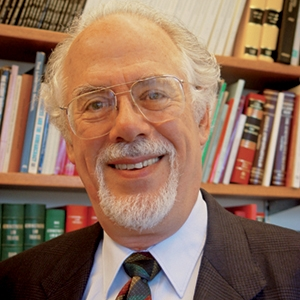 Peter L. Strauss, Betts Professor Emeritus of Law, Columbia Law School
Peter L. Strauss, Betts Professor Emeritus of Law, Columbia Law School
Peter L. Strauss is the Betts Professor of Law Emeritus at Columbia Law School. He joined the faculty in 1971, twice served as vice dean, and became emeritus July 1, 2017. He long taught courses in administrative law, legal methods, and legislation; as emeritus, he has been teaching legal methods I and the required elective on Legislation and Regulation.
He received his LL.B. from Yale Law School in 1964 and his A.B. from Harvard College in 1961. Before joining the Law School, he clerked for David L. Bazelon and William J. Brennan in Washington, D.C.; spent two years lecturing on criminal law in the national university of Ethiopia; and three years as an attorney in the Office of the Solicitor General, briefing and arguing cases before the U.S. Supreme Court. During 1975 to 1977, Strauss was on leave from Columbia as the first general counsel of the United States Nuclear Regulatory Commission.
In 1987, the American Bar Association’s section of administrative law and regulatory practice presented Strauss with its third annual award for distinguished scholarship in administrative law. From 1992 to 1993, he served as chair of the section. He has been a reporter for rulemaking on its APA and European Union administrative law projects, and was a member of its E-Rulemaking task force. In 2008, the American Constitution Society awarded him the first Richard Cudahy prize for his essay “Overseer or ‘The Decider’? The President in Administrative Law.”
Strauss has been a visitor at the European University Institute, Harvard University, the Max Planck Institute for Comparative Public and International Law, McGill University, and New York University, and has lectured widely on American administrative law abroad, including programs in Argentina, Australia, Belarus, Brazil, Canada, China, Colombia, England, France, Germany, Hong Kong, India, Italy, Japan, the Netherlands, New Zealand, Singapore, Turkey, and Venezuela. During 2008 to 2009, he was Fernand Braudel Senior Fellow at the European Law Institute and Parsons Fellow at the University of Sydney Law School.
A life member of the American Law Institute, in 2010 Strauss was elected to the American Academy of Arts & Sciences. He has also long been a faculty member on the board of the Law School’s Public Interest Law Foundation.
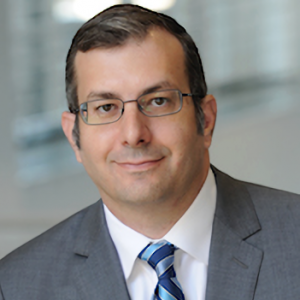 Nicholas Almendares, Visiting Assistant Professor, Seton Hall University School of Law
Nicholas Almendares, Visiting Assistant Professor, Seton Hall University School of Law
Nicholas Almendares received his J.D. from the New York University School of Law and his Ph.D. from NYU’s Department of Politics. Prior to coming to Seton Hall he was a Visiting Assistant Professor at Tulane University Law School where he was also affiliated with the Murphy Institute for Political Economy. He clerked for the Honorable Janis Graham Jack in the Southern District of Texas.
His research and teaching interests include civil procedure, torts, election law, legal theory, and law and economics. His scholarship includes proposals for alternative approaches to campaign financing following Citizens United, highlighting the unexpected democracy-enhancing effects of judicial review, and the dangers of aggressive judicial review of administrative agencies. His recent work concerns class action doctrine and its relationship to collective entities like corporations and states and a broad-ranging project on the implications of joint intention, such as its application to complicity and conspiracy.
Panel 3: Information Mischief under the Trump Administration
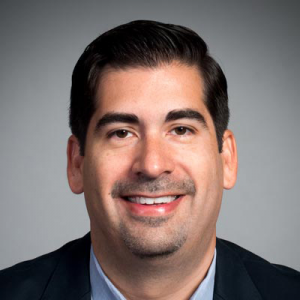 Nathan Cortez, Adelfa Botello Callejo Endowed Professor of Law in Leadership and Latino Studies, Dedman School of Law
Nathan Cortez, Adelfa Botello Callejo Endowed Professor of Law in Leadership and Latino Studies, Dedman School of Law
Professor Cortez, a Gerald J. Ford Research Fellow and the inaugural Adelfa Botello Callejo Endowed Professor of Law in Leadership and Latino Studies, teaches and writes in the areas of health law, administrative law, and FDA law. His research focuses on emerging markets in health care and biotechnology. Prof. Cortez has become one of the world’s leading legal scholars on medical tourism and other cross-border health markets, and has published several articles and book chapters on the legal and ethical implications of these phenomena. His research also addresses mobile health technologies and big data analytics, how to regulate innovation under aging regulatory frameworks, the First Amendment constraints on FDA regulation, immigration federalism, and alternative modes of regulation.
Professor Cortez has presented his research around the world, including to professional societies, at industry conferences, to regulators, and at several universities, including Colorado, Harvard, North Carolina, the University of Paris, Radboud University (Netherlands), Stanford, Texas, Wisconsin, and Yale. He also provides frequent commentary to the media, including the Associated Press, Chicago Tribune, CNN, the Huffington Post, the Los Angeles Times, the New York Times, NPR, WIRED, and Slate.com.
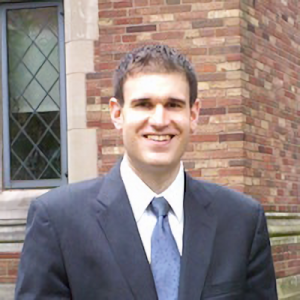 David Thaw, Assistant Professor of Law and Information Sciences, University of Pittsburgh School of Law
David Thaw, Assistant Professor of Law and Information Sciences, University of Pittsburgh School of Law
David Thaw is an Assistant Professor at the University of Pittsburgh. He holds appointments in the Schools of Law, Computing and Information, and Public and International Affairs. David is an internationally recognized expert in law and technology. His research and scholarship examine issues of cybersecurity regulation, cybercrime, cyber warfare, and related questions of privacy and cyberlaw. In addition to his cyber work, Professor Thaw is also a scholar of administrative and criminal law.
David teaches several cyber-related courses, including courses on cybersecurity law and on cybercrime. He also teaches administrative law, criminal law, criminal procedure, and constitutional law.
Professor Thaw’s legal scholarship has appeared in venues including the Washington Law Review, Connecticut Law Review, the Journal of Criminal Law and Criminology and the Yale Law Journal Online. His cybersecurity instructional text, Cybersecurity: An Interdisciplinary Problem (with Gus Hurwitz and Derek Bambauer) is under contract with West Academic Publishing.
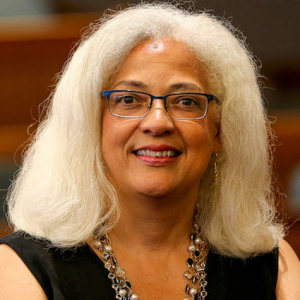 Renée M. Landers, Professor of Law, Suffolk University Law School
Renée M. Landers, Professor of Law, Suffolk University Law School
Renée M. Landers, Vice Chair of the Academy’s Board of Directors, is Professor of Law and Faculty Director of the Health and Biomedical Law Concentration at Suffolk University Law School, where she teaches administrative law, constitutional law, and health law. Landers also serves as a member of the Board of Directors of the Planned Parenthood League of Massachusetts.
The focus of Landers’s work has been on health care regulation, gender, and racial and ethnic bias in the legal system. Prior to joining the Suffolk University Law School faculty in 2002, she served as counsel in the health law group at the Boston law firm of Ropes and Gray for five years. From 1993 until 1996, she served as Deputy General Counsel for the U.S. Department of Health and Human Services and as Deputy Assistant Attorney General in the Office of Policy Development at the U.S. Department of Justice during the Clinton Administration.
Panel 4: Civil Servant Disobedience
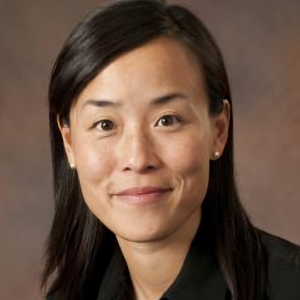 Jennifer Nou, Professor of Law, University of Chicago Law School
Jennifer Nou, Professor of Law, University of Chicago Law School
Jennifer Nou is Professor of Law at the University of Chicago Law School. Nou’s main research interests are in administrative law, executive branch dynamics, regulatory policy, and constitutional separation-of-powers. Prior to joining the faculty, she was a Public Law Fellow at the Law School and also worked as a policy analyst and special assistant at the Office of Information and Regulatory Affairs. Nou is a graduate of Yale College and Yale Law School, and received an MPhil in Politics from Oxford University as a Marshall Scholar. After law school, she was a law clerk to Judge Richard Posner of the US Court of Appeals for the Seventh Circuit and then to Justice Stephen Breyer of the US Supreme Court. She is currently a public member of the Administrative Conference of the United States.
 Bijal Shah, Associate Professor of Law, Sandra Day O’Connor College of Law
Bijal Shah, Associate Professor of Law, Sandra Day O’Connor College of Law
Bijal Shah’s teaching and scholarly interests lie in the areas of administrative law, structural constitutional law, immigration law (including “crimmigration”), international human rights law and LGBT law. Her work appears or is forthcoming in publications including the Harvard Law Review, Yale Journal on Regulation, Minnesota Law Review, Columbia Human Rights Law Review, and the New York University (NYU) Law Review Online, among others. Prior to joining the Sandra Day O’ Connor College of Law, Professor Shah was an acting assistant professor at the NYU School of Law. Professor Shah is also a co-managing editor of the Administrative & Regulatory Law News, published quarterly by the American Bar Association.
Before entering the academy, Professor Shah was Associate General Counsel for the Department of Justice / Executive Office for Immigration Review. In this position, she wrote immigration regulations, legislation and national policies on behalf of the General Counsel, the Director’s Office, and Congress.
Professor Shah is a graduate of the Yale Law School, where she was a senior editor on the Yale Law Journal and a Yale University Kirby Human Rights Fellow. Professor Shah is also a graduate of the Harvard University, Kennedy School of Government. Immediately after completing her law and graduate studies, Professor Shah was a Harvard University Sinclair Kennedy Fellow, during which time she worked with the Mauritian Ministry of Finance and Economic Development on women’s human rights and development issues in Mauritius. Before entering law school, Professor Shah was an investment banker at UBS PaineWebber.
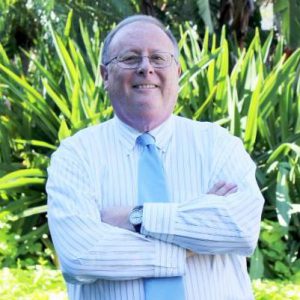 Joel A. Mintz, Professor Emeritus of Law, Shepard Broad College of Law
Joel A. Mintz, Professor Emeritus of Law, Shepard Broad College of Law
Joel A. Mintz has been a faculty member at Nova Southeastern University Shepard Broad College of Law since 1982. He teaches courses in Environmental Law, Torts, and Environmental Enforcement, and he has taught courses and seminars in Land Use Planning, State and Local Government Law, and Comparative Environmental Law.
Professor Mintz’s scholarship focuses primarily on environmental law and policy, environmental enforcement, sustainable development, regulation of hazardous wastes, and state and local taxation and finance. Mintz is the author of a well-received monograph, Enforcement at the EPA: High Stakes and Hard Choices (University of Texas Press, 1995) (revised edition, 2012), and a treatise on the federal environmental liabilities of state and local governments; and he has co-authored two casebooks, a “law-in-a-nutshell” work, and a handbook for attorneys on municipal finance. His law review articles have appeared in numerous journals and his articles and book contributions have been widely cited, quoted, and excerpted in texts, scholarly books, and articles. He has also published op-ed articles, perspective pieces, book reviews, and other works.
Panel 5: Regulatory Analysis in Deregulatory Times
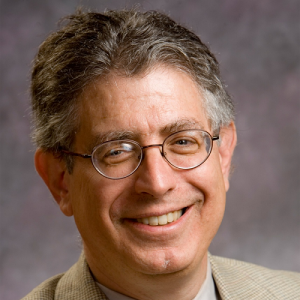 Daniel Farber, Sho Sato Professor of Law, UC Berkeley School of Law
Daniel Farber, Sho Sato Professor of Law, UC Berkeley School of Law
Dan Farber is the Sho Sato Professor of Law at the University of California, Berkeley. He is also the Faculty Director of the Center for Law, Energy, and the Environment. Professor Farber serves on the editorial board of Foundation Press. He is a member of the American Academy of Arts and Sciences and a Life Member of the American Law Institute. He is the editor of Issues in Legal Scholarship.
Professor Farber is a graduate of the University of Illinois, where he earned his B.A., M.A., and J.D. degrees. He graduated, summa cum laude, from the College of Law, where he was the class valedictorian and served as Editor-in-Chief of the University of Illinois Law Review. After graduation from law school, he was a law clerk for Judge Philip W. Tone of the United States Court of Appeals for the Seventh Circuit and then for Justice John Paul Stevens of the Supreme Court of the United States. Professor Farber practiced law with Sidley & Austin, where he primarily worked on energy issues, before joining the University of Illinois College of Law faculty in 1978. He was a member of the University of Minnesota Law School faculty from 1981 to 2002, where he was the McKnight Presidential Professor of Public Law. He also has been a Visiting Professor at the Stanford Law School, Harvard Law School, and the University of Chicago Law School.
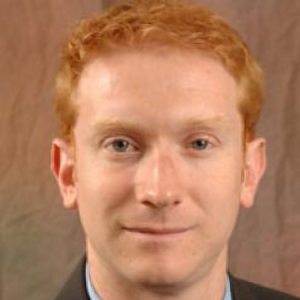 Jonathan S. Masur, John P. Wilson Professor of Law, University of Chicago Law School
Jonathan S. Masur, John P. Wilson Professor of Law, University of Chicago Law School
Jonathan Masur received a BS in physics and an AB in political science from Stanford University in 1999 and his JD from Harvard Law School in 2003. After graduating from law school, he clerked for Chief Judge Marilyn Hall Patel of the United States District Court for the Northern District of California and for Judge Richard Posner of the United States Court of Appeals for the Seventh Circuit. He joined the Law School faculty in 2007 and received tenure in 2012. He served as Deputy Dean from 2012 to 2014 and was named the John P. Wilson Professor of Law in 2014. He won the Graduating Students Award for Teaching Excellence in 2014 and 2017 and the Class Award in 2016. He has served as director of the Wachtell, Lipton, Rosen & Katz Program in Behavioral Law, Finance and Economics since its founding.
Masur’s research and teaching interests include patent law, administrative law, behavioral law and economics, and criminal law.
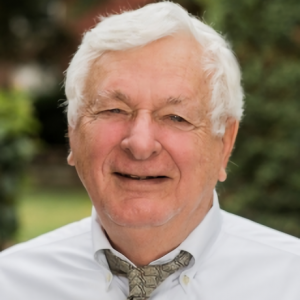 Richard J. Pierce, Jr., Lyle T. Alverson Professor of Law, George Washington University Law School
Richard J. Pierce, Jr., Lyle T. Alverson Professor of Law, George Washington University Law School
Professor Pierce is the author of over twenty books and 130 articles on administrative law, government regulation, and the effects of various forms of government intervention on the performance of markets. His books and articles have been cited in hundreds of judicial opinions, including over a dozen opinions of the U.S. Supreme Court.
Schedule – Day Two
| 8:00am–9:00am | Check-In & Breakfast | 5th Floor Lounge |
| 9:00am–10:30am | Panel 1: Deregulatory Splintering and the Constraints of Law, Reasoned Decisionmaking, and Factual Contingency | Room 520 |
| 10:30am–10:45am | Break | 5th Floor Lounge |
| 10:45am–12:00pm | Panel 2: The Regulatory Accountability Act and the Future of APA Revision | Room 520 |
| 12:00pm–12:10pm | Closing Remarks | Room 520 |
Panel Participants
Panel 1: Deregulatory Splintering and the Constraints of Law, Reasoned Decisionmaking, and Factual Contingency
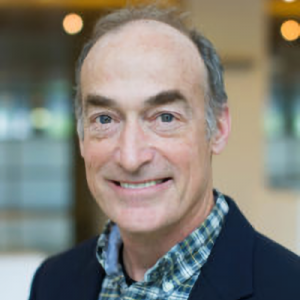 William W. Buzbee, Professor of Law, Georgetown University Law Center
William W. Buzbee, Professor of Law, Georgetown University Law Center
William W. Buzbee is a professor of law at Georgetown University Law Center. In his teaching and scholarship, he specializes in environmental law, legislation and regulation, and administrative law. Recent publications focus on climate regulation, deregulation and law governing agency policy change, and federalism. He also offers seminars on advanced environmental, regulatory, and constitutional law subjects, with his most recent seminar focused on “The Art of Regulatory War.”
Professor Buzbee’s books include the recently published Fighting Westway: Environmental Law, Citizen Activism, and the Regulatory War that Transformed New York City (Cornell University Press 2014) and Preemption Choice: The Theory, Law and Reality of Federalism’s Core Question (Cambridge University Press, hardcover 2009, paperback 2011) (William W. Buzbee editor and contributor). He has been a co-author of the 5th , 6th, 7th and forthcoming 8th editions of Environmental Protection: Law and Policy (Aspen/Wolters Kluwer). Law review scholarship includes publications in New York University Law Review, University of Pennsylvania Law Review, Michigan Law Review, Stanford Law Review (co-authored), Cornell Law Review (co-authored), Duke Law Journal (forthcoming), George Washington Law Review, Iowa Law Review, The Journal of Law and Politics and in an array of other journals, books, news outlets, and blogs. Three of his articles have been named among the 10 best environmental or land use law articles of that year and republished in the Land Use and Environment Law Review. He regularly assists with appellate and Supreme Court environmental, federalism, and regulatory litigation, and also has testified before congressional committees on environmental and regulatory matters. He has published op-eds on regulatory and environmental issues with The New York Times, The Hill, CNN, and been quoted and interviewed by numerous press and media outlets.
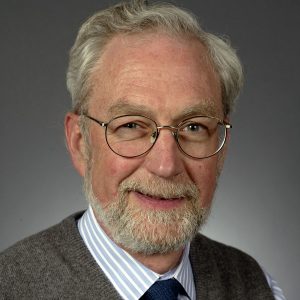 Todd D. Rakoff, Byrne Professor of Administrative law, Harvard Law School
Todd D. Rakoff, Byrne Professor of Administrative law, Harvard Law School
Todd Rakoff graduated from Harvard Law School in 1975, and joined the faculty in 1979 after clerking for Hon. Henry Friendly and practicing with Foley, Hoag and Eliot in Boston. He teaches contracts and administrative law, has been Dean of the J.D. Program, and is presently the Byrne Professor of Administrative Law. Since the mid-1980s he has been one of the editors of Gellhorn and Byse’s Administrative Law, a leading book in the field.
Professor Rakoff has been actively involved in many of HLS’s educational experiments and reforms of the last quarter century, including the experimental integrated curriculum of the 1980s and the move to smaller first year sections in the late 1990s. In the last several years, he and Professor Joseph Singer have created and led the School’s Problem Solving Workshop, an experiential course that is now a required part of the first year curriculum. He has also organized programs for teachers around the country, through the Association of American Law Schools, and internationally, through the parallel international association.
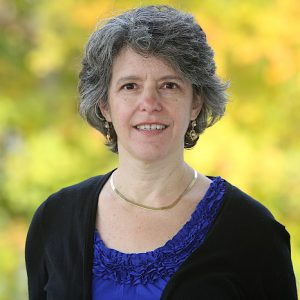 Rebecca M. Bratspies, Professor of Law, CUNY School of Law
Rebecca M. Bratspies, Professor of Law, CUNY School of Law
Rebecca Bratspies is a Professor of Law at the CUNY School of Law and the founding director of the CUNY Center for Urban Environmental Reform. She has published widely on regulatory policy—with a focus on environmental democracy, regulating new technologies, and corporate responsibility. Her recent scholarship explores questions of urban sustainability, and the intersection of human rights and environmental regulation. She is a scholar with the Center for Progressive Reform, the Environmental Law Collective and has served as an appointed member of the ABA Standing Committee on Environmental Law, a member of the Executive Committee of the American Association of Law Schools Section on the Environment, and an advisor to the Consultative Group on Agricultural Research.
Before entering academia, Professor Bratspies served as a judicial law clerk to the Honorable C. Arlen Beam of the Eighth Circuit Court of Appeals. As a Henry Luce Foundation Scholar, Professor Bratspies spent a year seconded to the Republic of China (Taiwan) Environmental Protection Administration. She has taught at the University of Idaho, Michigan State University and NYU. She holds a BA in Biology from Wesleyan University and a J.D. cum laude from the University of Pennsylvania.
Panel 2: The Regulatory Accountability Act and the Future of APA Revision
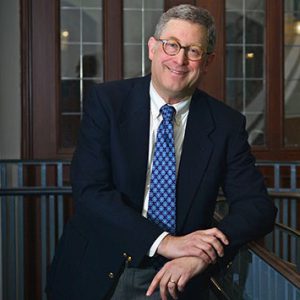 Ronald M. Levin, William R. Orthwein Distinguished Professor of Law, Washington University School of Law
Ronald M. Levin, William R. Orthwein Distinguished Professor of Law, Washington University School of Law
Ronald M. Levin, the William R. Orthwein Distinguished Professor of Law, specializes in administrative law and related public law issues. His coauthored books include a casebook, State and Federal Administrative Law, now in its fourth edition, and a student text, Administrative Law and Process in a Nutshell, now in its sixth edition. He has testified before Congress on regulatory reform issues and has published numerous articles and book chapters on administrative law topics, including judicial review, rulemaking, and legislative reform of the regulatory process. He also has written about the law of lobbying and legislative ethics. Professor Levin has been active in the ABA Section of Administrative Law and Regulatory Practice for more than three decades and served as its Chair in 2000–01. He currently represents the Section in the ABA House of Delegates. He also served as the ABA’s advisor to the drafting committee to revise the Model State Administrative Procedure Act. He is a senior fellow of the Administrative Conference of the United States and has chaired its Judicial Review Committee. He is also a member of the American Law Institute. Before joining the law faculty, Professor Levin clerked for the Hon. John C. Godbold, U.S. Court of Appeals for the Fifth Circuit, and practiced for three years in Washington, D.C., with the firm of Sutherland, Asbill & Brennan. He was the Associate Dean of the School of Law from 1990–1993.
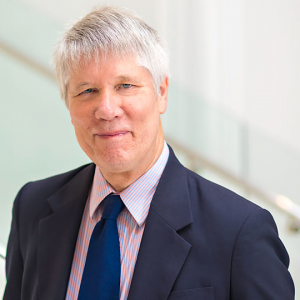 Jeffrey Lubbers, Professor of Practice in Administrative Law, American University Washington College of Law
Jeffrey Lubbers, Professor of Practice in Administrative Law, American University Washington College of Law
Jeffrey Lubbers is a Professor of Practice in Administrative Law and is also active as a Fellow in WCL’s Law and Government Program. He holds expertise in administrative law; government structure and procedures; and regulatory policy and procedures. In addition to teaching Administrative Law, he also teaches the Washington Lawyer Seminar, the keystone course in the LLM in Law and Government Program. He also serves as WCL’s liaison to Japanese Law Schools, having taught at WCL’s “sister school,” Ritsumeikan University School of Law in Kyoto, for seven summers. From 2012-15 he was Director of WCL’s Europe Summer Law Program. He has also engaged in numerous administrative law reform projects in China in the last 20 years. From 1982–1995, Professor Lubbers was the research director of the Administrative Conference of the United States, where he is now Special Counsel. He has published two books: A Guide to Federal Agency Rulemaking (5th ed., ABA Press, 2012) and Federal Administrative Procedure Sourcebook (5th ed., ABA Press, 2016). He also served as the editor of the ABA’s Developments in Administrative Law and Regulatory Practice (16 vols., 1998–2014).
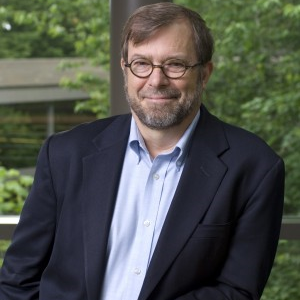 William Funk, Lewis & Clark Distinguished Professor of Law Emeritus, Lewis & Clark Law School
William Funk, Lewis & Clark Distinguished Professor of Law Emeritus, Lewis & Clark Law School
Professor Funk is the author of American Constitutional Structure and a co-author of one of the leading administrative law casebooks, Administrative Procedure and Practice: Problems and Cases, as well as Administrative Law: Examples & Explanations and the Federal Administrative Procedure Sourcebook. Together with Professor Craig Johnston, Professor Funk is also a co-author of Legal Protection of the Environment, an environmental law casebook. In 2004–05, Funk was a Senior Fulbright Scholar at the University of Heidelberg, where he taught both American constitutional law and environmental law. Funk has published numerous articles on administrative and environmental issues, including in such publications as the Duke Law Journal, the Harvard Journal on Legislation, the Yale Journal on Regulation, the Administrative Law Review, and the U.C.L.A Journal of Environmental Law and Policy. He has chaired both the Administrative Law and Natural Resources Law Sections of the American Association of Law Schools. Funk is also active in the American Bar Association, where he recently served on the ABA’s President’s Task Force on Preemption of State Tort Law and where he is a Fellow of the Administrative Law and Regulatory Practice Section, which he formerly chaired and on whose Council he served. Professor Funk is also a Center for Progressive Reform Scholar, a member of the American Law Institute, and a Fellow of the American Bar Foundation. He has been admitted to practice in New York, the District of Columbia, and before the U.S. Supreme Court.


